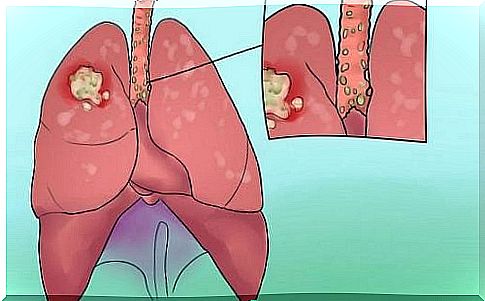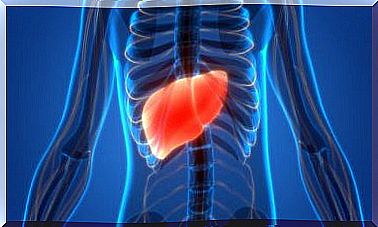8 Shocking Signs Of Lung Cancer You Should Not Ignore

Lung cancer is one of the most deadly diseases. Contrary to many people’s beliefs, it does not just affect those who smoke. Therefore, it is very important to know the signs of lung cancer.
Non-smokers also often develop this deadly form of cancer. This is because we are all exposed to other factors that can trigger it, such as:
- Air pollution
- Passive smoking
- Exposure to carcinogenic chemicals such as asbestos and radon
Chest pain is one of the primary symptoms. However, you should not overlook the other signs of lung cancer that are less well known.
Depending on the stage of the disease, you may experience some of the symptoms we describe below.
Confusion about signs of lung cancer
Many ailments, which can be a warning about this type of cancer, often go unnoticed initially or are confused with another disease.
The symptoms are often due to colds or fatigue due to physical exertion.
However, if you are able to immediately note these first symptoms and seek medical attention, it will greatly increase the effectiveness of the treatment.
The symptoms to look for are:
Persistent cough

This is usually a dry cough. However, it can sometimes be accompanied by blood. Other people will notice the production of a thick, reddish mucus.
If you have a cough that lasts more than a month and you notice that your voice is more hoarse or deeper than normal, it is a good idea to go to a respiratory specialist as soon as possible. The specialist must perform a series of tests to rule out the possibility of lung cancer.
Many people ignore this symptom simply because it can be painful to get the tests done, especially if you think you are healthy. But just keep in mind that the sooner you take the plunge, the sooner you will be able to get rid of any kind of lingering doubt.
Chronic infections
Have you noticed that you often suffer from bronchitis or other infections for no apparent reason? If this is the case then you should ask your doctor to investigate this issue in more detail.
Something that should make the alarm bells ring in particular is chest pain, which is not a common part of bronchitis and similar infections.
- It is very common to assume that such chest pain is related to heart problems.
- If your cardiologist has already ruled this out, be sure to have your doctor evaluate your lungs.
3. Weight loss

If you have recently lost weight without making any changes to your diet or before starting a new exercise program, you should stop thinking about why this has happened.
While it may seem like something you might like, it is important to keep in mind that it may be a sign of a problem with your body.
4. Bone pain
This is a sign of lung cancer, which usually makes us notice when the disease has already spread to other parts of the body. Usually, the back and hips are the areas affected.
Some people tend to see bone pain as a common and inappropriate ailment, especially due to their age. But no matter how old you are, you should always make sure that bone pain is not a sign of a more serious problem.
Inflammation of the neck and face
This happens when the tumor increases the amount of pressure on the vena cava, the vein responsible for transporting blood from your head and arms back to your heart.
Inflammation of the neck and face occurs because the blood flow is slower than it should be. In this case, you will notice that you are not able to get rid of inflammation or swelling with massage or other techniques.
6. Muscle weakness
This symptom of lung cancer can affect your hips, arms, shoulders or legs. It is common to notice weakness and lack of strength that makes your daily activities more difficult.
7. High calcium levels

Some forms of lung cancer cause higher levels of calcium that are released into the bloodstream. This causes the following symptoms:
- Frequent urination
- Constipation
- Excessive thirst
- Nausea
- Stomach ache
- Dizziness
The only way to find out if these symptoms are related to lung cancer is by a blood test.
8. Difficulty breathing
Have you started snoring a lot? Do you have difficulty performing simple tasks that used to be a breeze? Does moderate walking leave you without air, even though it has never been a problem before?
Lung cancer affects aerobic capacity. If you notice any of these changes, go to your doctor immediately to perform some tests.
Only a doctor can determine if you are suffering from a more serious problem or if the troublesome breathing is a result of old age or lack of physical activity.
Be aware of any unexpected changes
As you can see, many of these can be a symptom of a problem other than lung cancer.
It is important that you pay attention to changes in your body that are not a product of a change in diet, physical activity or medication.
As soon as you become aware of any of these changes, you should contact your doctor and ask them to assess what is behind the changes.
Hopefully this is just a false alarm. However, it can also allow you to detect another disease in good time.
In addition, keep in mind that cancer is a disease in which early diagnosis increases the chances of successful treatment.
You should also try to stay away from known carcinogens that will increase the risk of developing cancer, such as tobacco smoke and other harmful chemicals.
Do you know anyone who shows signs of lung cancer?









